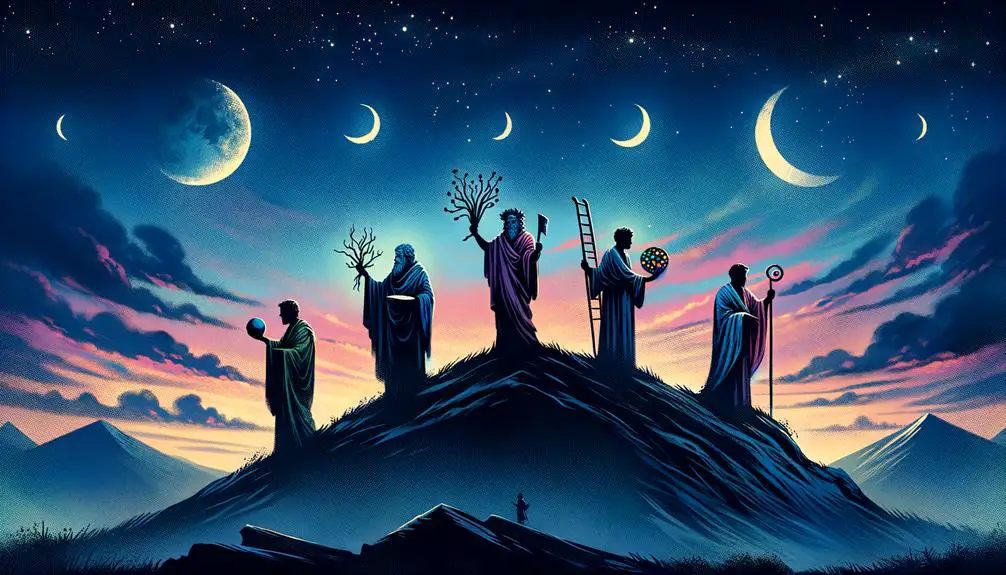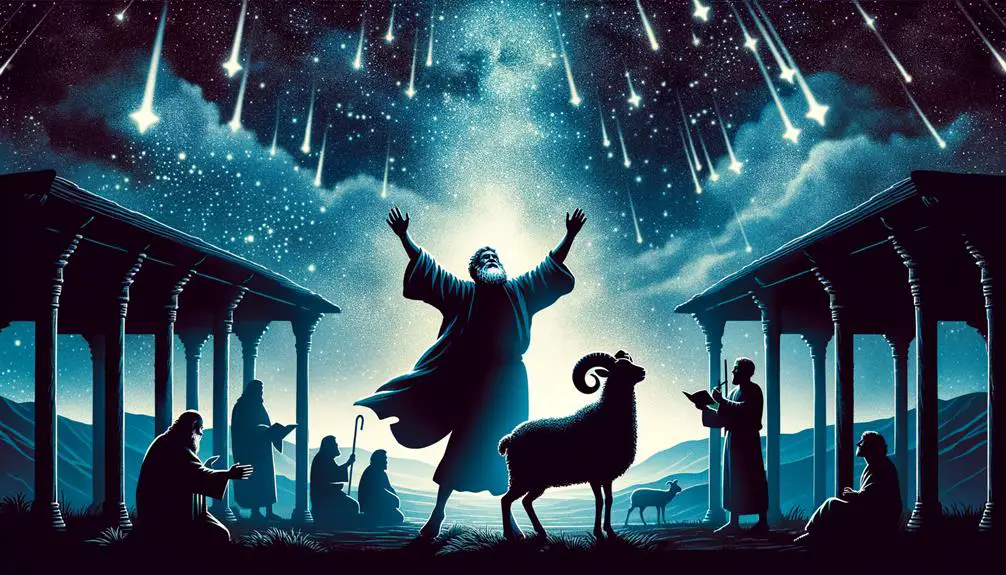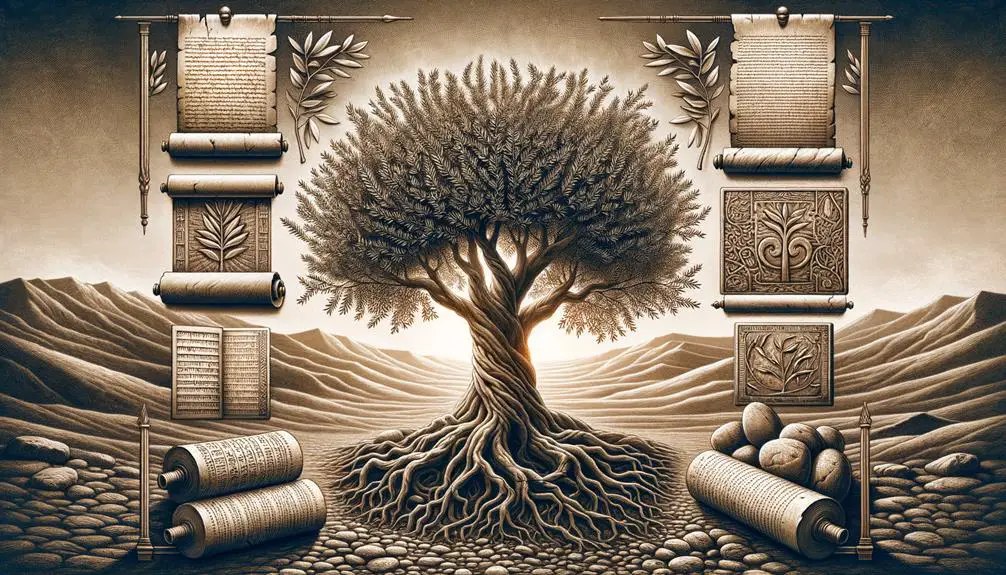Know the patriarchs of the Bible: Abraham, Isaac, and Jacob, whose epic journeys shaped faith and destiny, inviting exploration into their profound legacy.

Who Are the Patriarchs in the Bible
In the tapestry of biblical history, the patriarchs are the foundational threads intertwining faith, promise, and legacy. You've likely heard of Abraham, Isaac, and Jacob, figures who not only fathered nations but also shaped the spiritual contours of many. Their lives, marked by moments of both triumph and trial, offer a rich field for exploration.
But beyond these well-known figures, there's a deeper narrative and a lineage that extends to the Twelve Tribes of Israel. Unraveling their stories and their impact might just change how you view the roots of faith and tradition. Curiosity piqued? Let's venture further into their world, where ancient tales await to enlighten the present.
Key Takeaways
- The patriarchs in the Bible are Abraham, Isaac, and Jacob, foundational figures in Israelite history.
- They embody themes of faith, obedience, and spiritual evolution within their narratives.
- The patriarchs' divine encounters and personal transformations significantly influence Israelite culture and religious practices.
- Their legacies, through teachings and covenants, continue to shape Jewish identity, values, and traditions.
The Meaning of Patriarchs

In biblical contexts, the term 'patriarchs' frequently refers to the founding fathers of the Israelite people, embodying significant religious, moral, and societal roles within the scriptural narratives. These figures, primarily Abraham, Isaac, and Jacob, are pivotal in shaping the ethos and beliefs of the Israelite community. The narratives surrounding these patriarchs are imbued with layers of meaning, reflecting not only on the character and faith of these individuals but also on the broader patriarchal society in which they existed.
This patriarchal society, as depicted in the biblical texts, was characterized by a system where males held primary power and predominate in roles of political leadership, moral authority, social privilege, and control of property. In analyzing these texts, you're delving into a complex interplay of historical, religious, and cultural dimensions. The historical accuracy of these patriarchal narratives has been a subject of considerable debate among scholars. While some argue that these figures are largely symbolic or mythological, others suggest they're based on historical persons whose stories have been embellished over time.
Your exploration into the meaning of patriarchs within the Bible reveals the intricate ways in which these narratives functioned within their society. They not only provided a moral and religious framework for the Israelite people but also reflected and reinforced the societal norms of their time. The study of these patriarchal figures and the society they represent offers invaluable insights into the ancient world and its enduring influence on subsequent generations.
Abraham: Father of Nations
You'll find Abraham's covenant with God and his journey to Canaan as foundational elements in understanding his role as a patriarch.
This covenant establishes him as a central figure, promising him countless descendants and positioning him as the father of many nations.
His migration, in obedience to divine command, marks a pivotal moment in biblical history, highlighting themes of faith and obedience.
Abraham's Covenant With God
One of the pivotal moments in biblical history is God's covenant with Abraham, marking him as the father of nations and setting the stage for significant theological developments. This covenant included divine promises and land inheritance, underscoring Abraham's central role in the narrative.
Aspect |
Description |
Significance |
|---|---|---|
Divine Promises |
God's assurance of blessings |
Foundation of faith |
Land Inheritance |
Promise of Canaan to Abraham's descendants |
Symbol of divine favor |
Multiplication |
Increase in Abraham's descendants |
Emergence of a great nation |
Blessings to Nations |
Through Abraham's lineage |
Universal impact |
Covenant Sign |
Circumcision |
Physical mark of the covenant |
This covenant not only signifies a deep, personal relationship between Abraham and God but also introduces concepts foundational to later theological constructs.
Journey to Canaan
Following the establishment of God's covenant with Abraham, the narrative then shifts to his monumental journey to Canaan, underscoring his obedience and trust in divine guidance. This trek isn't merely a physical relocation but symbolizes a profound leap of faith towards establishing a new covenantal lineage.
Canaan's geography, characterized by its diverse terrain ranging from arid deserts to fertile plains, plays a pivotal role in this narrative. It's a land that promises prosperity but also challenges with its myriad local cultures and established city-states. Abraham's interactions with these local cultures underscore the complexities of navigating a foreign land while maintaining faith.
This journey, thus, isn't just about reaching a physical destination but about the transformation it incites within Abraham and his followers, shaping the very foundation of what would become a new spiritual lineage.
Isaac: The Promised Son

Isaac, the promised son of Abraham and Sarah, holds a pivotal role in the narrative of the Bible, symbolizing the fulfillment of God's covenant. His birth, predicated on divine promise, embodies a significant theological theme: faith in God's provision. Isaac's laughter, emerging from his name which means 'he will laugh,' reflects the joy and incredulity associated with his miraculous conception and birth. This element of laughter not only underscores the unexpected nature of God's blessings but also foreshadows the complex dynamics of faith and doubt within the human experience.
The sacrifice dilemma, involving Isaac, further accentuates the depth of Abraham's faith and the complexity of divine-human relations. This episode, where Abraham is commanded to offer Isaac as a sacrifice, serves as a profound test of faith and obedience. It highlights the tension between divine command and human affection, raising questions about trust, sacrifice, and the nature of God's promises. The resolution, with a ram provided as a substitute for Isaac, reinforces the theme of divine provision and the notion that God's covenantal promises are both trustworthy and imbued with deeper meanings beyond human understanding.
Isaac's narrative thus serves as a critical juncture in the biblical account of the patriarchs, bridging the foundational promises made to Abraham with the continuation of the covenant through his descendants. His story reflects the intricate interplay of faith, promise, and provision, offering insights into the character of God and the nature of divine-human interaction within the covenantal framework.
Jacob: The Deceiver Transformed
You'll find Jacob's narrative in the Bible is a compelling study of character evolution, from his early deceptions to his pivotal encounter with the divine.
This transformation culminates in his renaming to Israel, marking a significant shift in his identity and role within the biblical story.
Analyzing these events offers insights into themes of redemption and the complex relationships between human frailty and divine intervention.
Jacob's Early Deceptions
Jacob's early deceptions mark a complex period in his life, illustrating a transformative journey from cunning trickster to a figure of significant spiritual growth.
Central to this narrative is the acquisition of Esau's birthright, an episode underscored by profound sibling rivalry. This act of deception, where Jacob capitalizes on his brother's immediate hunger to secure a future leadership role and blessing, sets the stage for his character's evolution. It not only reveals the strategic cunning of Jacob but also reflects the deep-seated competition between the brothers.
These early actions, while morally ambiguous, serve as a precursor to Jacob's eventual encounters with divine forces, reshaping his identity and destiny. Through these deceptions, Jacob's character is both critiqued and developed, laying the groundwork for his path towards spiritual maturity.
Wrestling With the Divine
In a pivotal moment that marks a profound transformation, Jacob wrestles with a divine entity, an encounter that epitomizes his transition from a deceiver to a figure of spiritual significance. This event isn't just a physical struggle but a metaphorical journey, reflecting inner change and growth.
- Angelic encounters provide a framework for understanding divine intervention and guidance.
- Divine dreams serve as conduits for communication between the divine and the mortal realm.
- The act of wrestling symbolizes the struggle with faith, identity, and destiny.
- This moment underscores the complexity of human-divine relationships, highlighting negotiation, challenge, and eventual reconciliation.
Analyzing this narrative reveals the layered nature of biblical stories, where spiritual encounters are essential for character development and thematic depth.
Transformation Into Israel
Building on the pivotal wrestling match, we now explore how Jacob's identity and destiny are reshaped, marking his transformation into Israel, a figure of immense spiritual and historical significance. This metamorphosis isn't merely personal; it's foundational in shaping the cultural identity and religious practices of a burgeoning nation.
By overcoming divine adversity, Jacob earns a new name, symbolizing not only his change but also the birth of Israel as a distinct entity. You'll find that this transformation is pivotal, laying the groundwork for the development of unique religious practices and a strong, cohesive cultural identity.
Jacob's journey from a deceiver to a patriarch underlines the dynamic nature of faith and identity, illustrating how personal change can reverberate through generations, molding the spiritual and cultural contours of an entire people.
The Twelve Tribes of Israel
Deriving from the patriarch Jacob, also known as Israel, the Twelve Tribes of Israel represent foundational elements in the historical and religious narrative of the Jewish people. Each tribe, named after one of Jacob's sons or, in the case of Joseph, his two sons Ephraim and Manasseh, holds unique tribal characteristics that have been subject to various interpretations over time. These interpretations reflect on the tribes' roles and destinies within the biblical context, as well as their implications for modern Jewish thought.
In analyzing the Twelve Tribes of Israel, it's important to consider:
- The distinct tribal symbols and banners, which are often linked to Jacob's blessings and prophetic utterances in the book of Genesis.
- The geographical territories assigned to each tribe in the land of Israel, shaping their historical and social development.
- The varying roles and reputations of the tribes, from Judah's leadership to Levi's priestly duties, and how these have influenced Jewish tradition and identity.
- Modern interpretations of the tribes, which range from metaphorical and spiritual applications to discussions about their historical and archaeological realities.
This analysis not only deepens our understanding of the tribal characteristics and their significance in biblical times but also allows us to explore how these ancient narratives continue to resonate within modern interpretations. The Twelve Tribes of Israel, thus, serve as a bridge connecting the past with present-day Jewish culture and religious practice, highlighting the enduring legacy of the patriarchs in shaping Jewish identity and heritage.
Legacy of the Patriarchs

The legacy of the patriarchs profoundly shapes the cultural and religious identity of the Jewish people, serving as a cornerstone for understanding their enduring influence on modern Judaism. These ancestral figures' life stories, teachings, and choices have cascaded through generations, significantly affecting family dynamics and the broader cultural impact within and beyond the Jewish community.
Aspect |
Impact on Family Dynamics |
Cultural Impact |
|---|---|---|
Teachings |
Promote unity and respect |
Foster a sense of belonging and identity |
Actions |
Set examples of faith and perseverance |
Influence moral and ethical standards |
Covenants |
Bind families with shared spiritual commitments |
Establish a unique relationship with the divine |
Analyzing the patriarchs' narratives reveals how their interactions and decisions established patterns of behavior and belief that resonate in Jewish family life today. For instance, the emphasis on hospitality, justice, and community support mirrors the patriarchs' actions and teachings, underscoring their relevance in contemporary societal norms.
Moreover, the patriarchs' stories have been instrumental in shaping the Jewish cultural identity, imbuing it with a rich tapestry of values, traditions, and a deep connection to the land. Their legacies are commemorated in rituals, festivals, and daily practices, ensuring their continuous influence on the collective consciousness of the Jewish people.
In essence, the patriarchs' enduring legacy is a testament to the power of faith, the importance of family bonds, and the impact of cultural narratives on shaping a community's identity and values. Their stories offer timeless insights into human nature, moral dilemmas, and the quest for a meaningful life, making their legacy as relevant today as it has ever been.
Frequently Asked Questions
How Did the Concept of Patriarchs Influence Other Religions Outside of Judaism?
The concept of patriarchs has significantly influenced other religions through the adoption of patriarchal symbols and the facilitation of interfaith dialogues.
You'll find these symbols integrated into various religious narratives, emphasizing the role of male figures in spiritual leadership.
Moreover, discussions around these patriarchal concepts have bridged understanding between different faiths, encouraging a more unified approach to interpreting sacred texts and traditions.
This cross-pollination enhances mutual respect and deepens spiritual connections.
What Archaeological Evidence Exists to Support the Historical Accuracy of the Biblical Patriarchs?
You're diving into a topic where archaeological evidence plays a critical role. It's not just about unearthing artifacts; it's about understanding the genealogical debates and cultural impact these findings have.
Scholars analyze pottery, inscriptions, and settlement patterns to piece together the historical accuracy of ancient narratives. While direct evidence linking to specific biblical patriarchs is elusive, these discoveries contribute to a broader understanding of the era's historical and cultural context.
How Have Interpretations of the Roles and Stories of the Patriarchs Evolved in Modern Theology?
In modern theology, interpretations of patriarchal figures have undergone significant shifts. Theological reinterpretations often challenge traditional views, incorporating fresh insights into patriarchal symbolism.
These reinterpretations aim to uncover deeper meanings and relevance within ancient narratives, adapting them to contemporary contexts. This evolution reflects a broader trend in theological scholarship, which seeks to engage critically with sacred texts, ensuring their enduring impact and significance in modern spiritual discourse.
In What Ways Have the Stories of the Patriarchs Been Depicted in Art and Literature Throughout History?
Throughout history, the stories of these key figures have been vividly depicted in Renaissance paintings and literary adaptations, showcasing their enduring appeal and influence.
You'll find that artists and writers have creatively interpreted their narratives, embedding them within broader cultural and religious discourses.
This artistic and literary engagement not only reflects the period's values and aesthetics but also offers insights into the evolving perceptions of these foundational stories in human history.
How Do Contemporary Feminist Theologians View and Critique the Patriarchal Narratives Within the Bible?
You're delving into a realm where contemporary feminist theologians scrutinize biblical narratives through a critical lens. They explore gender dynamics, often challenging traditional interpretations.
Through scriptural reinterpretations, they aim to uncover and critique the embedded patriarchal views.
Their analysis doesn't merely skim the surface but deeply questions the roles and representations of women, offering fresh perspectives that challenge long-held beliefs about gender roles within these sacred texts.
Conclusion
In conclusion, the patriarchs of the Bible aren't just ancient figures; they're titanic pillars upon which the entire edifice of Judeo-Christian civilization rests. Abraham, Isaac, and Jacob weren't mere men, but colossi striding across history, casting long shadows over millennia.
Their legacies, encapsulated within the Twelve Tribes of Israel, aren't just familial lines but the very blueprint of faith and morality. In studying them, you're not merely learning history; you're unearthing the foundations of spiritual identity.



Sign up